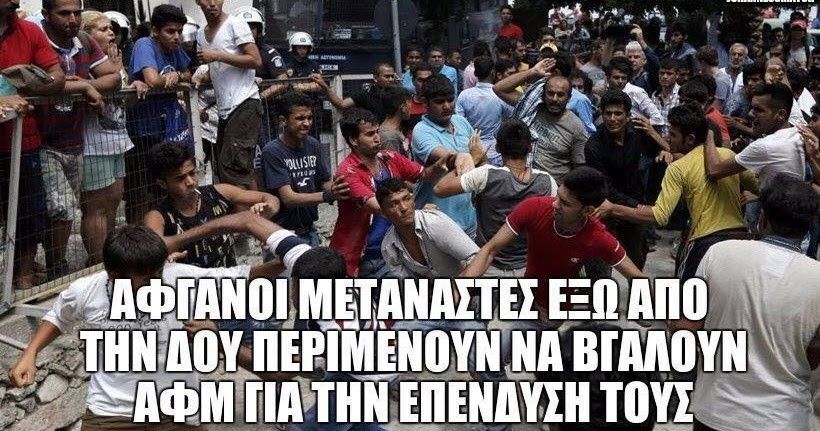Meme (1): Afghan migrants outside the tax office waiting to get a TIN for their investment

Meme (2): Shortly in Omonoia Square [i.e. a central square in Athens]!
What do we see here?
In meme (1), a photo of quarrelling people (perhaps of Asian descent) is transformed into a meme via adding verbal text to it. The text suggests that the people in the photo are Afghan migrants acting as potential investors in the Greek economy: they fight with each other and do not seem to be able to behave ‘properly’ and ‘patiently’ outside a Greek tax office, where they are queuing to get a taxpayer identification number (TIN), which is required for their investments. Through humorous exaggeration, migrants are projected as an uncivilized and violent mob, namely as inferior people who cannot control themselves.
Through the same meme-creating technique, in meme (2), a photo of a man of African descent handcuffing a police officer is recontextualized to signify a role reversal between Greek authorities and migrants. Greek badges have been added to the police officer’s shirt to localize the ‘event’. So, meme (2) implies that roles and power relations could be subverted within the Greek territory: ‘illegal’ migrants could become a ‘legal force’ and arrest police officers.
Both memes were collected from the social media in November 2019.
Which public issue is being addressed here?
Since 2015, when the current migration ‘crisis’ began, racist discourses and attitudes have gained prominence within European nation-states in an effort to achieve and maintain linguocultural ‘homogeneity’ as well as to stigmatize and exclude migrants. On the other hand, extreme racist behaviors are usually hindered or banned therein (e.g. through antiracist legislation), so verbal racist attacks have often acquired a mitigated form. Therefore, while the overt and fanatic hatred accompanying racism may not be officially tolerated, subtle forms of racism easily find their way into the European public sphere. Both these Greek memes reproduce widespread racist stereotypes according to which migrants are uncivilized individuals threatening to seize power in Greece.
More specifically, meme (1) alludes to the Greek government’s suggestion that some of the migrants arriving at Greece from Syria (or elsewhere) are well-off people who managed to bring their money to European banks and would be interested in investing in the Greek economy. The meme attempts to satirize and discredit this suggestion. The representation in meme (2) is premised on, and reproduces, the widespread racist stereotype that migrants are criminals threatening the Greek sovereignty and social order, and could eventually become more powerful than the Greek majority. Such a role reversal is framed as incongruous and hence humorous.
What does the humor do?
In a public sphere where racist views and values are more often than not perceived as unaccepted and condemnable, yet remain pervasive and sometimes undetected (see above), humor is often exploited to mitigate or disguise racist meanings and views and to render them acceptable and commonsensical.
Nowadays, such humor often takes the form of memes circulating in the social media. Memes are based on the combination of semiotic resources (in the present cases, verbal texts added to photos, whether modified or not). They can be used for the representation and dissemination of complex ideas and values, often in an unconventional manner (in the present cases, through exaggeration and role reversal). Most importantly, since meme humor is often processed in a light-hearted manner and not critically scrutinized, it manages to convey ideological meanings and stereotypes concerning a wide variety of sociopolitical topics and events (here the migration ‘crisis’) with the aims of persuading, criticizing, and even stereotyping (in the present cases, migrants).
Bibliography
Archakis, A. & Tsakona, V. 2019. Racism in recent Greek migrant jokes. Humor: International Journal of Humor Research 32(2): 267-287. https://www.degruyter.com/document/doi/10.1515/humor-2018-0044/html
Archakis, A. & Tsakona, V. 2021. Greek migrant jokes online: A diachronic-comparative study on racist humorous representations. Internet Pragmatics 4(1): 28-51. https://benjamins.com/catalog/ip.00063.tsa
Shifman, L. 2014. Memes in digital culture. Cambridge: MIT Press. https://mitpress.mit.edu/books/memes-digital-culture
Weaver, S. 2016. The Rhetoric of Racist Humor: US, UK and Global Race Joking. London: Routledge. https://www.routledge.com/The-Rhetoric-of-Racist-Humour-US-UK-and-Global-Race-Joking/Weaver/p/book/9781138624665
Wiggins, B. E. 2019. The Discursive Power of Memes in Digital Culture: Ideology, Semiotics, and Intertextuality. New York: Routledge. https://www.routledge.com/The-Discursive-Power-of-Memes-in-Digital-Culture-Ideology-Semiotics-and/Wiggins/p/book/9780367661335
